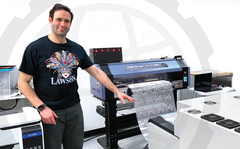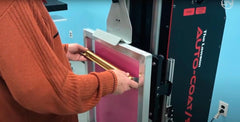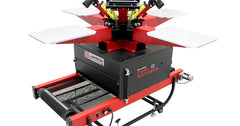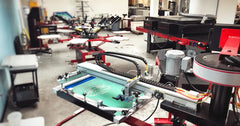When starting a screen printing business many people print out of their garage or basement. This is a great way for beginner screen printers to make the most of the space they already have by setting up shop in a home garage. A screen printing machine, essential equipment and supplies, and some simple tweaks ensure the best environment for smooth printing are all you need to start your small business.
What Screen Printing Equipment and Supplies Do You Need?
At a minimum, you will need a screen printing machine, dryer, and exposure unit. Look for a start-up screen printing package to equip your shop as quality shop set up packages should include equipment, supplies and training. For example, Lawson’s beginner start up package includes equipment (a screen printing press, flash dryer, exposure unit, conveyor dryer, and washout booth), supplies (ink, emulsion, chemicals and other items), in-person training and 24/7 print support.
Once your equipment is ready to go, you will need some basic screen printing supplies, including plastisol ink and pre-stretched aluminum frames.
How Should You Figure Out a Layout?
Positioning your screen printing equipment in the right places makes the process of screen printing much easier. The amount of equipment you get determines how much space you need but a simple start up package only needs about 6 ft x 8 ft of space. The screen printing equipment should fit into a garage with enough room to move around. If you are tight on space, consider space saving ideas like shelving to help with the organization of supplies and screens and including racks for screens.
When positioning your screen printing equipment, don’t forget there is more to your business then just printing. How are you going to handle deliveries? What if a customer wants to pick up their order? Are you going to continue utilizing your garage door for access and deliveries when setting up? Thinking through these questions provides a long term solution for your print shop.
How Do You Set Up an At-Home Darkroom?
You’ll also need a screen room, also known as a darkroom, for preparing screens to be printed. This area should be separate as it is where you will work with emulsion that is light sensitive. Some simple at home places could be a bathroom, laundry room, spare room, or even a closet can be set up as a darkroom, so long as you can control the light, temperature, and humidity levels. You could also carve out your own enclosed darkroom space within your garage if you get creative with putting up some walls or light filtering plastic.
Inside your darkroom, you will need to control the light levels in the darkroom by installing a yellow light-safe light bulb and preventing UV light from entering the room. Many home renovation stores sell a bulb cover to go over regular lights for UV filtering. These are often a cheaper and more permanent option than buying “bug lights.”
It is particularly convenient to have the washout space connected to or close to the darkroom and you can use a water source that’s available in your garage, laundry room, bathroom, or yard. Be sure to avoid rinsing out chemicals where children, pets, or sensitive drains will be at risk.
How Do You Keep Everything Clean and Stored Properly?
Keeping dust and dirt away from your screens is crucial, but can be especially difficult in a space like a garage. Deep-cleaning the space before setting up your screen printing shop goes a long way to ensure the space and equipment stay clean. Plus, you should build into your schedule a regular cleaning routine that includes both the shop space and the equipment itself.
A couple of pro tips is avoid using spray adhesive as much as possible. Liquid pallet glue goes a long way towards helping keep your shop clean, mainly by eliminating sticky surfaces for all the tshirt lint to If you will be using a fan to speed up the drying process or to cool the space, take care to avoid blowing dust particles around by keeping the fan on a low setting.
Assuming your garage is not insulated, you will want to be aware of the possible pitfalls of printing and storing supplies in an environment that is not temperature-controlled. In particular, chemicals and inks will react poorly to extreme hot and cold temperatures, humidity, and fluctuations in temperature. Do your best to store screen printing chemicals and plastisol inks in a temperature-controlled environment. Consider the use of space heaters, dehumidifiers, and air conditioning units as your climate necessitates.
How Do You Properly Insurance Yourself?
Don’t assume that your homeowner’s insurance will cover the loss of all screen printing business equipment in the case of a fire or theft that occurs at your home. Most personal homeowner’s insurance will not cover business equipment unless it is specifically requested in your policy. Talk to your insurance agent about adding it, or look into separate business insurance that would just cover your home based screen printing equipment.
Building a screen printing shop in a garage is a great way to start up your business. With a little extra creativity and care, you can establish an efficient and convenient screen printing business in no time.







